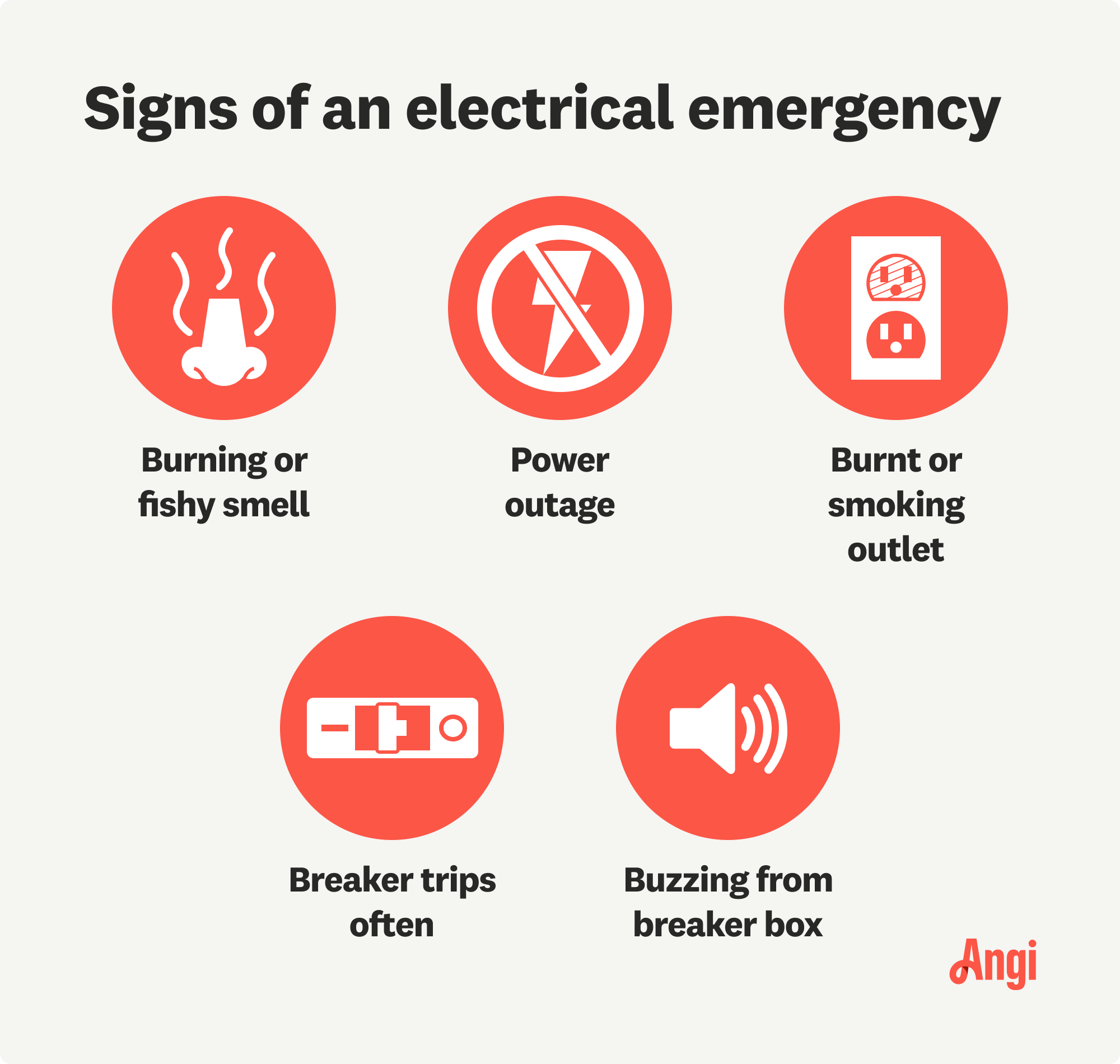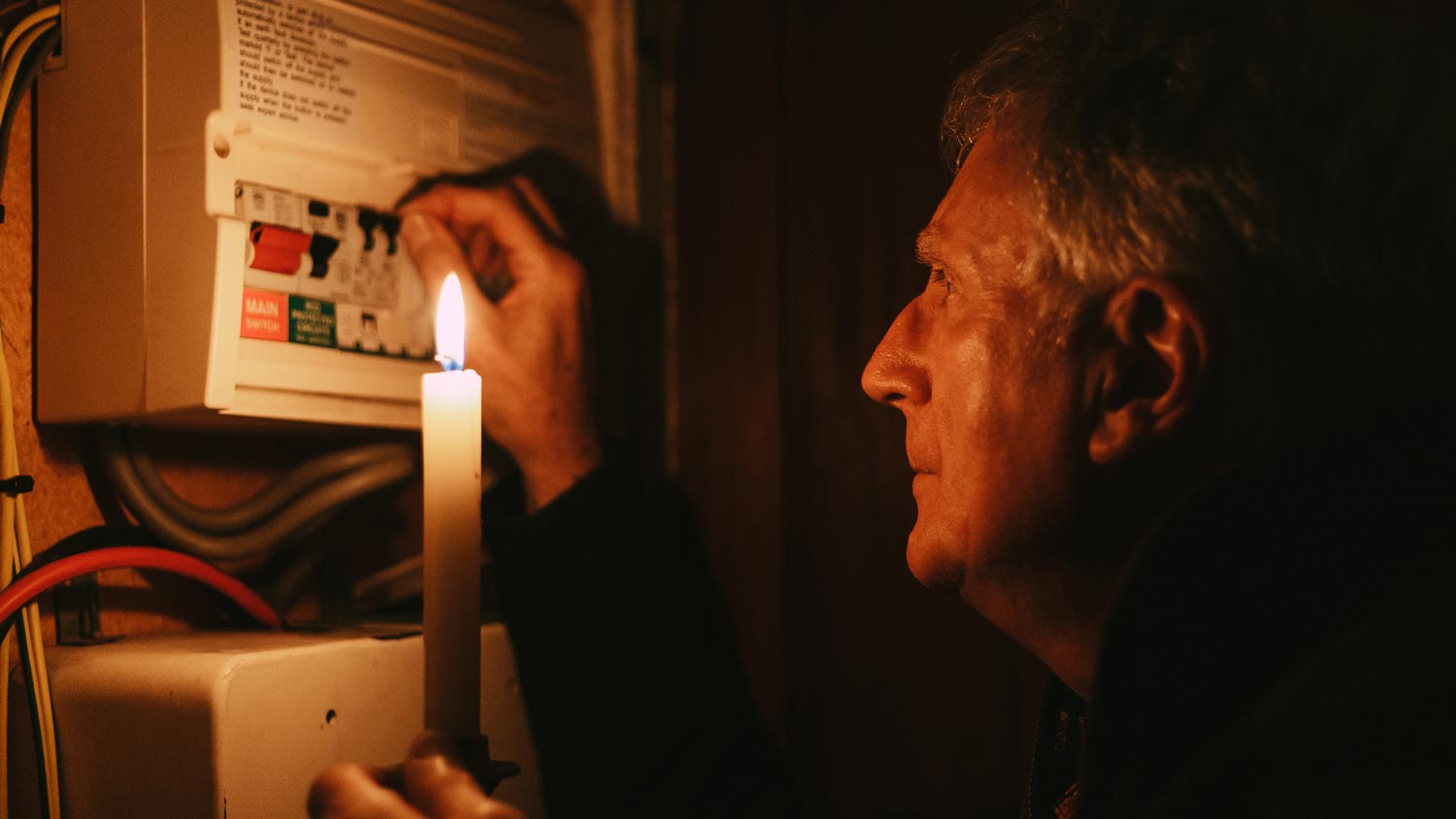
How much does rewire house cost in Columbus? Learn the major factors that impact the price and how it can help increase your home's value.
Prompt action prevents sparks from flying when your wiring goes wonky


Electrical emergencies typically put people or property at risk.
When faulty electrics are a fire or electric shock risk, turn off the power, if it is safe to do so, and call an emergency electrician.
Call emergency services if a fire begins or someone suffers a serious electric shock.
Call your electricity supplier when there is a neighborhood power outage or downed power line.
When something goes wrong with your home's electrical system, things can grind to a halt. Understanding what an electrical emergency is and how to deal with one will help keep your family safe and prevent your electrical devices and systems from experiencing serious damage.
Thankfully, many basic electrical repairs are DIYable, but there are times to take urgent action to remedy an electrical danger. Let’s review common electrical emergencies and how to handle them as quickly and safely as possible.

An electrical emergency is any fault with your home’s electrical system that puts people or property at risk, including fire, electrical shock, or injuries due to electrical failure. These types of emergency situations need prompt and prudent action. If your home has experienced electrical failure or is at risk, the best option is always to turn to professional electricians for help.
Electrical equipment failure, natural disasters, or even human error can all result in a classified electrical emergency. Knowing the difference between something manageable and major can save you from unnecessarily spending money on an emergency call-out and, more importantly, could save lives. Check out these common electrical dangers that warrant immediate attention and action.

When the power in your whole house goes out and resetting the main circuit breaker doesn’t get you up and running again, you’ll want to check if it’s only a problem with your home or across the wider area.
Damage to local power lines because of storms, floods, or accidents and major equipment failure in your home can cause a complete loss of power to your home and its surrounding area. However, if the power outage is only affecting your home, not your neighbors, there’s likely an issue with your circuit breakers or fuse box.
If it’s a problem in your home, calling an emergency electrician will help you get back on track as quickly as possible. A wider outage or a downed power line in your yard necessitates a call to your electricity supplier.
In the meantime, follow these steps to keep everyone safe and minimize disruption:
Shut off the power at the main breaker.
Turn off all appliances, outlets, and lights to prevent a sudden surge causing damage when power resumes.
Cover and close refrigerators and freezers to keep them cold for as long as possible.
Leave one light on to alert you if the power suddenly returns.
Use flashlights, candles, blankets, and battery-powered fans to keep you comfortable while you wait for the power to return.
For downed power lines, stay well away from the affected area and watch out for signs of fire.

Unfortunately, electrical issues are a common cause of home fires, but many are preventable if you’re savvy and spot the early warning signs.
Faulty or outdated wiring or appliances and overloaded sockets are common culprits of electrical fires.
The following can are early warning signs of an electrical fire:
Burning odor from an outlet
Sizzling or buzzing sounds in an outlet
Warm wall plates
Smoke or sparks coming from an outlet or appliance
Brown or black wall sockets
To prevent electrocution risk, don’t unplug the appliances or switch off the outlet in question. If a fire is underway, the first thing to do is get everyone in the house outside safely and call emergency services.
If it is safe to do so and the fire isn’t rapidly spreading, cut the power at the main breaker and then, if you have an electrically approved fire extinguisher, use this to tackle the fire. Never use water to douse a fire on electrical equipment—otherwise, you risk electrocution.
Even if you notice a slight burning odor or some sparks, prevent home electrical fire risk by cutting the power to that area at the circuit breaker and immediately call an electrician.

Being vigilant and looking for faulty electrics reduces the risk of costly repairs and fires, and minimizes the chances of suffering from electric shocks. If someone in the household experiences an electrocution, get help from emergency services immediately.
The following behaviors are common causes of household electrocution:
Touching exposed or wet wires
Repairing an appliance when it is plugged in
Ignoring damaged wires, outlets or appliances
Thankfully, not all shocks are life-threatening. It depends on the current type, voltage strength, and how the current travels through the body. However, speedy, appropriate treatment can make a big difference in the short- and long-term effects of electrocution.
For serious shocks, avoid touching the person if they are still in contact with the current and call 911 immediately. If it is safe to do so, turn off the power at the circuit breaker box. Keep the person warm and apply a sterile bandage or clean cloth to any burns. If the person isn’t breathing, begin CPR while you wait for the emergency services to arrive.
Even if the shock was gentle, turn off the power and wait for an emergency electrician to inspect the system and perform appropriate repairs.

If your circuit breaker is faulty, it can lead to risky overloads and dangerous short circuits where the electrical current takes the wrong path. While it might not always be an electrical emergency, major faults can lead to fires or electric shock.
Serious circuit breaker faults are often a result of the box being old, outdated, or overloaded.
Signs that your circuit breaker is bad include:
Burning odors
Scorch marks
Warm to the touch
Visibly damaged wires
Frequent tripping
When burning odors, scorch marks, or sparks are coming from your circuit breaker, that merits an immediate power shutdown and a call to an emergency electrician near you. But, even if these more worrying signs aren’t cropping up, upgrading an old electrical panel that keeps tripping is a worthwhile investment for convenience and peace of mind.
Even if you’re not experiencing an electrical emergency, there are some signs your home has an electrical problem that you shouldn’t ignore. Overlooking them could lead to a dangerous electrical emergency down the line. If you notice these warning signs, hire a local electrician to investigate and make repairs where appropriate.
Some things to watch out for include:
Flickering lights
Regularly tripping breaker
Warm fixtures
Malfunctioning outlets or switches
Outlet sparks
Buzzing sounds near switches or outlets
From average costs to expert advice, get all the answers you need to get your job done.

How much does rewire house cost in Columbus? Learn the major factors that impact the price and how it can help increase your home's value.

The cost to move an electric meter depends on how far you’re moving it, whether it needs replacing, and the cost of labor near you.

How much does adding an electrical outlet cost in Columbus? Get details on average pricing, permit needs, and what affects the total cost.

Flickering lights and breaker trips can be a sign that it’s time to replace a circuit breaker. Find out the cost, safety tips, and how to replace a circuit breaker.

Nearly every electrical wire in your home has a different purpose. This article will cover the types of electrical wires, what they’re for, and how you can tell them apart.

Grounded circuits are happy (and safe) circuits, but what if you live in an older home with pre-grounded receptacles? Here are ways to ground without a wire.